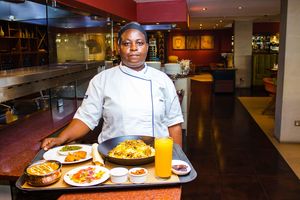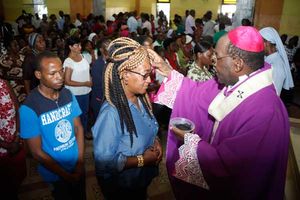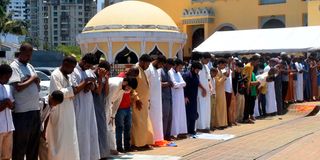
Muslim faithful praying at Masjid Ummu Kuthum on the first Friday of the holy month of Ramadhan on March 7, 2025.
As the soft glow of dawn spreads across the horizon, the world stirs from slumber, and the faithful of two religions, Christianity and Islam, rise in humility.
In homes where followers of each faith gather, the call to prayer is answered with devotion.
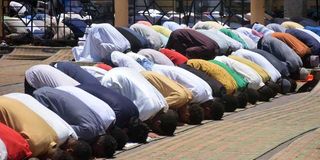
Muslim faithful in prayer at the Masjid Ummu Kuthum during the first Friday of the Holy Month of Ramadhan on March 7, 2025.
This is a month in which the two, though following different beliefs, are engaged in key religious observances: Lent for Christians and Ramadan for Muslim faithful.
“For the first time, the two religions are fasting and praying together. Perhaps it has happened before, but for me, this is the first time I am witnessing this wonderful moment in religion,” says Sheikh Ali Pama.
During this Christian season of Lent and the Islamic holy month of Ramadan, adherents of both faiths are experiencing a rare convergence of fasting, prayer, and reflection.
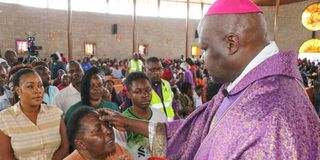
Bishop Cleophas Oseso Tuka of the Catholic Diocese of Nakuru applies ash to the forehead of a worshipper during Ash Wednesday at the Cathedral Church of Christ the King - Nakuru, March 5, 2025.
While theological differences between these two spiritual journeys are evident, their practices create a bridge of shared experience, an opportunity for unity that transcends religious boundaries.
In cities and towns across the country, dawn breaks with the hum of devotion.
For Muslims, the pre-dawn meal, Suhoor, is a sacred time. The faithful wake before sunrise to nourish their bodies before embarking on a day of fasting.
For Christians, the early morning hours during Lent, particularly on fasting days, are often spent in prayer and meditation.
Both religions begin the day with a focus on spirituality, making these hours a reflection of mutual devotion.
“On normal days, I have not seen Christians observing dawn prayers, but during this season, I see large numbers heading to church at 5am and returning home to prepare for work. It delights my spirit,” notes Sheikh Pama.
As the day unfolds, fasting remains a central act of worship for both faiths.
Muslims abstain from food and drink from dawn until sunset. Meanwhile, Christians who observe Lent may fast in various ways, by skipping meals, giving up certain luxuries, or dedicating time to charity and reflection.
“What unites these observances is the discipline of self-denial and the spiritual strength drawn from it. We call on Christians to give more, to sacrifice their greatest desires for the sake of the needy,” says Robert Mkolwe, Chairperson of the Tana River Interfaith Community.

Mining Cabinet Secretary Hassan Joho (centre) with Mombasa Governor Abdulswamad Nassir, Senator Mohamed Faki, Jomvu MP Badi Twalib, County Assembly Speaker Aharub Khatri and Mvita MP Mohamed Soud during the distribution of food donated by Hassan Joho Foundation to Muslims observing the Holy Month of Ramadhan in Mombasa in this photo taken on March 8, 2025
For both Christians and Muslims, fasting is not merely about deprivation but about deepening their relationship with God, seeking closeness through sacrifice.
In the evening, as the sun sets, the spirit of unity and harmony manifests once more.
The breaking of the fast, whether Iftar for Muslims or the end of a Lenten day of abstinence for Christians, is a time of gathering, a shared moment.
In some communities across the country, interfaith dinners have become a symbol of solidarity, where Christians and Muslims sit side by side, united by their shared experience of fasting. “In such a season, we look out for one another. After enduring the struggle of perseverance and the discipline of faith, the best we can become is one family,” says Halima Salat, a Madrassa teacher.
In some neighbourhoods in Tana River County, for instance, it is common to see families of different faiths exchanging invitations to break their fast together.
The traditional Muslim Iftar meal is often shared with Christian neighbours, while Christian families observing Lent may open their doors to their Muslim friends.
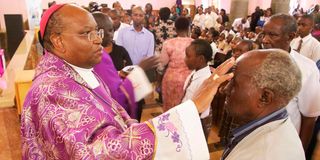
Nyeri Catholic Archbishop Anthony Muheria applies ashes to the forehead of a worshipper during the Ash Wednesday service at Our Lady of Consolata Catholic Cathedral in Nyeri on March 5, 2025.
The sight of men and women from different religious backgrounds gathering around the same table, breaking bread, and offering prayers is a testament to the power of faith in fostering community. These months are also marked by acts of charity — another point where the two faiths converge.
Whether through Zakat in Islam, where Muslims give alms to the needy, or through the Lenten call to almsgiving, the faithful from both religions are deeply engaged in helping those less fortunate. In many places, this shared sense of duty extends beyond religious boundaries. Community centres and interfaith organisations host charity drives, with Muslims and Christians working together to collect food, provide shelter, and support those in need. The rhythm of prayer is another beautiful parallel between the two observances.
During Ramadan, Muslims offer special nightly prayers called Tarawih, performed after the Isha prayer. Similarly, Lent is a time when Christians engage more deeply in prayer, often through communal worship services such as the Stations of the Cross or special Lenten Masses.
Both faiths find strength and solace in these moments of connection with God and with one another.

